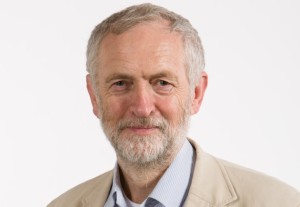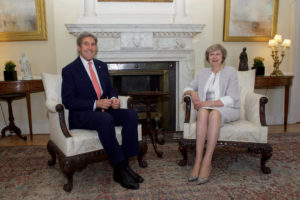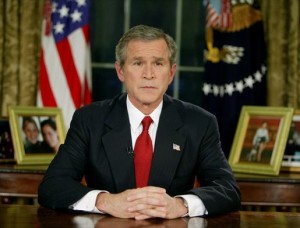كوربن قال الحقيقة عن الإرهاب

السياسي البريطاني جيريمي كوربن
لورنس دافيدسون* - (كونسورتيومنيوز) 10/6/2017ترجمة: عبد الرحمن الحسينييحيل محللون الأداء القوي لحزب العمال البريطاني في الانتخابات البريطانية إلى قضايا اقتصادية. لكن زعيم الحزب، جيريمي كوربن، قال للناخبين الحقيقة أيضاً عن الكيفية التي عززت بها حروب الغرب في الشرق الأوسط الإرهاب.
* * *
يوم 26 أيار (مايو) الماضي، ألقى جيريمي كوربن، زعيم حزب العمال البريطاني، كلمة تطرقت في الجزء الأكبر منها إلى السياسة الأمنية والسياسة الخارجية. وكان الكثير من عرضه دقيقاً على نحو يثير الدهشة. وفيما يلي ما قاله:
- ثمة علاقة سببية "بين الحروب التي دعمتها حكوماتنا وخاضتها في بلدان أخرى، وبين الإرهاب هنا في الوطن". وعلى سبيل المثال، يمكن ربط تفجير مانشستر يوم 22 أيار (مايو)، والذي أسفر عن مقتل 22 شخصاً، بانخراط المملكة المتحدة في الإطاحة بحكومة معمر القذافي في ليبيا وبالحروب الأهلية التي تبعتها.
- هذه العلاقة السببية ليست مسألة تكهنات. "لقد أشار العديد من الخبراء، بمن فيهم محترفون في أجهزتنا المخابراتية والأمنية، إلى هذه الروابط".
- لم تبد الحكومات السابقة أي رغبة في مخاطبة هذه الروابط. والآن، يواجه الشعب في المملكة المتحدة "حرباً على الإرهاب، والتي لا تعمل ببساطة".
- "نحن في حاجة إلى طريقة ذكية لخفض التهديد من البلدان التي تغذي الإرهابيين وتولد الإرهاب. ولذلك، وعد كوربن بأنه في حال توليه رئاسة الوزراء، فإنه سوف يغير ما نفعله في الخارج".
كانت كلمة كوربن غير اعتيادية، لأنه نادراً ما يشير القادة السياسيون إلى أن سياساتنا التي تدعمها مجموعات المصالح الخاصة الرئيسية (مثل الصهاينة والخليجيين وصناعة الأسلحة)، هي في الواقع مجموعة أخطاء كارثية. والأكثر ندرة هو أن يبوح الساسة بهذا جهاراً. وفي حالة الهجمات الإرهابية، أنحى كل قائد غربي تقريباً باللائمة في ذلك على "الإسلام المتطرف"، (مغفلين بطبيعة الحال أي إشارة إلى الدول الشرق أوسطية التي تنتج أيديولوجياتها العنف).
وقد اشترى الجمهور في جزئه الأكبر هذا الطرح، لأنه يردد صدى رسالة الإعلام التي تشكل مصدر معلوماته الأساسي عن معظم الموضوعات غير المحلية. ولم تقل وسائل الإعلام للجمهور أبداً إن السياسات الخارجية الإجرامية لحكوماته قد أسهمت في جلب الإرهاب إلى شواطئه. والآن، تأتي رسالة جيريمي كوربن لتقول إن السياسات البريطانية في الخارج لها علاقة بالمآسي البريطانية في الوطن.
رد الفعل
يمكن أن يكون هذا التحدي الأساسي للسياسة صادماً، ولذلك رد أعداء كوربن بغضب. فمثلاً، وصف بن والاس، وزير الدولة للشؤون الأمنية في الحكومة المحافظة الحالية، ملاحظات كوربن بأنها "فظة وتأتي في توقيت مروع". وتعني كلمة "فظة" أنها وقحة أو سوقية، ومن الصعب رؤية كيف يمكن أن يكون قول الحقيقة البدهية في اللغة الانكليزية المقبولة معادلاً للفظاظة.
وإذن، لماذا يتم وصف توقيت كوربن، الذي جاء بعد وقت قصير من الهجوم الإرهابي في مانشستر، بأنه "مروع"؟ هل كان من واجب زعيم حزب العمال أن ينتظر هدنة في هذه الهجمات حتى تفوت هذه النقطة على الجمهور البريطاني؟
كما انغمس والاس في إنكار عنيد، فاتهم كوربن بأنه معادٍ للتاريخ في تقييمه للأعداء الإرهابيين. وقال "إن هؤلاء الناس (الإرهابيين) يكرهون قيمنا وليس سياستنا الخارجية".
من المحبط رؤية أن المحافظين في عموم العالم الغربي تعلموا القليل جداً -إذا تعلموا شيئا أصلاً- منذ العام 2001. وكان ذلك هو العام الذي قدم فيه جورج دبليو بوش الفكرة المضللة ببشاعة، والتي يردد بن والاس صداها الآن. وبعد 11/9 مباشرة، أعلن بوش أن الإرهابيين يفعلون ما يفعلونه (في الغرب على الأقل) لأنهم "يكرهون حرياتنا".
يعرف كل من يألف مواقف متشددي الشرق الأوسط، الدينية أو العلمانية، أن الغالبية العظمى لا تُعنى بأي نوع من القيم والحريات التي نمارسها في بلداننا الخاصة. لكنهم مع ذلك يعيرون اهتماماً للسياسات الخارجية الضارة التي نفرضها على بلدانهم. بالإضافة إلى والاس، انتقد تيم فارون، زعيم الحزب الليبرالي الديمقراطي البريطاني، كوربن على استخدامه لحظة هجوم مانشستر الإرهابي لتسجيل "نقطة سياسية". ومع ذلك، يبدو أنها نقطة فاتت على فارون. فالمهم في بيان كوربن هو أنه يضع في السياق الصحيح، ليس هجوم مانشستر وحسب، بل وأيضا الهجمات الإرهابية الأخرى كافة في الغرب. وتشكل رسالة كوربن تحليلاً تاريخياً دقيقاً له معانٍ سياسية.
ما نفع ذكر الحقيقة؟
من الواضح أن للساسة أسبابا أنانية لإنكار أنهم أساؤوا الفهم والحساب، ثم أصروا على انتهاج السياسات السيئة التي أفضت إلى موت وتدمير مواطنيهم، بالإضافة إلى الآخرين. ومما لا شك فيه أن نوعاً من قصر النظر الخاص المدفوع بالمصلحة الذاتية يسمح لبعضهم بالاعتقاد بأنهم إذا تمسكوا باستراتيجيتهم فقط، فإنهم سيسودون.
هذه بالتأكيد هي حالة الرئيس الأميركي دونالد ترامب. فبعد الهجوم الإرهابي الأحدث في لندن، قال للعالم عبر "تويتر": "يجب علينا التوقف عن فكرة أننا محقون سياسياً وأن نهبط إلى الاهتمام بأمن شعوبنا".
اصطف ذلك جيداً مع التعليق العام لرئيسة الوزراء تيريزا ماي من أن الحكومة البريطانية ما تزال "متسامحة جداً" حيال الإرهاب. ولهذه الكلمات القليل من المعنى الفعلي. وهي تميل أكثر إلى أن تكون كلمات رمزية للعنف الغربي المستمر في الشرق الأوسط، والذي يعرفه السيد كوربن بأنه السبب وراء وجود الهجمات الإرهابية في جزئنا من العالم في المقام الأول.
أشار استطلاع للرأي العام البريطاني أجري قبل انتخابات 8 حزيران (يونيو) الحالي إلى أن 75 في المائة من من المستطلعين يعتقدون الآن بأن جيريمي كوربن محق، وأن هناك صلة بين التدخل في مستنقع الشرق الأوسط وبين الإرهاب في المملكة المتحدة. ويدعي الاستطلاع بأن عينته تمثل الجمهور ككل.
ثم في 9 حزيران (يونيو)، جرت الانتخابات العامة في المملكة المتحدة. ونتيجة لها بقي المحافظون الحزب الأكبر في البرلمان، وإنما بعدد منخفض من المقاعد بشكل خطير. ومن أجل الحكم بأغلبية مطلقة، يحتاج الحزب إلى 326 مقعداً. لكن المحافظين كسبوا 319 مقعداً مقارنة مع 261 مقعداً للعمال. وهناك عدة أحزاب أخرى، مثل الديمقراطيين الأحرار، لكن عدد مقاعهم أقل بكثير. وعلى سبيل المثال، كسب الديمقراطيون الأحرار 12 مقعداً فقط. لكن ذلك شكل عموماً كسباً للعمال وخسارة للمحافظين.
يدلي الناس بأصواتهم للعديد من العوامل -معظمها محلي الطابع (وهكذا تكونت فكرة الصوت الواحد). ومع ذلك، يشكل الإرهاب عاملاً يغزو الفضاء المحلي لمزيد من المواطنين البريطانيين. وهكذا نستطيع أن نفترض بأمان على الأقل أن بعضاً ممن دعموا حزب العمال في هذه الانتخابات فعلوا ذلك لأنهم قبلوا تحذير جيريمي كوربن من وجود صلة بين السياسة الخارجية الحالية للمملكة المتحدة وبين حالة عدم الأمن المحلي. أما أولئك الذين علقوا آمالهم على استمرار حكم حزب المحافظين، فقد صوتوا بلا مبالاة لصالح إرهاب لا نهاية له في حديقتهم الخلفية.
*أستاذ التاريخ في جامعة ويست تشستر في بنسلفانيا. وهو مؤلف كتب "شركة السياسة الخارجية: خصخصة مصلحة أميركا القومية"، و"فلسطين أميركا: المفاهيم الشعبية والرسمية من بلفور إلى الدولة الإسرائيلية"، و"التشدد الإسلامي".
U.K.’s Corbyn Told Truth about Terrorism
June 10, 2017
Analysts credit the Labour Party’s strong showing in the U.K. election to economic issues, but its leader, Jeremy Corbyn, also told voters the truth about how the West’s Mideast wars have spread terrorism, notes Lawrence Davidson.
By Lawrence Davidson
On May 26, Jeremy Corbyn, the leader of British Labour Party,
made a speech which dealt in large part with security and foreign policy. Much of his presentation was surprisingly accurate. Here is what he said:

Jeremy Corbyn, the new leader of Great Britain’s Labour Party.
—There is a cause-and-effect relationship “between wars our governments supported and fought in other countries and terrorism here at home.” For instance, the May 22 Manchester bombing, which killed 22 people, may well be connected to the United Kingdom’s involvement in the overthrow of the Libyan government of Muammar Gaddafi and the subsequent civil wars.
—This cause-and-effect relationship is not a matter of speculation. “Many experts, including professionals in our intelligence and security services, have pointed to these connections.”
—Past governments have not been willing to address these connections, and now the people of the U.K. are confronted with a “war on terror that is simply not working.”
—“We need a smarter way to reduce the threat from countries that nurture terrorists and generate terrorism.” Therefore, Corbyn promised that, if he were to become the leader of the British government, he would “change what we do abroad.”
Corbyn’s speech is unusual because political leaders rarely point out that policies supported by major special interest groups (such as the Zionists, Saudis and the arms industry) are really catastrophic errors. More rarely still do politicians say so in public. In the case of terrorist attacks, almost every Western leader has blamed “radical Islam” (leaving out, of course, any reference to Saudi Wahhabism).
The public at large has gone along with this view because it echoes the media message that constitutes the source of their knowledge on most non-local subjects. The media outlets have never told them that the murderous foreign policies of their own governments contributed to terrorism coming to their shores. And now, along comes Jeremy Corbyn’s message that British policies abroad have something to do with British tragedies at home.
The Reaction
Such a fundamental challenge to policy can be traumatic, so Corbyn’s political foes have responded with indignation. For instance, Ben Wallace, Minister of State for security in the present Conservative government,
labeled Corbyn’s remarks as “crass and appallingly timed.” The word “crass” means rude or vulgar and it is hard to see how stating a truism in acceptable English qualifies as crass.

U.S. Secretary of State John Kerry sits with British Prime Minister Theresa May in the White Room No. 10 Downing Street in London, U.K., on July 19, 2016. [State Department Photo]
Just so, why characterize Corbyn’s timing, coming shortly after the Manchester terror attack, as “appalling”? Should the Labour Party leader have waited for a lull in such attacks so that his point would be missed by the British public?
Wallace also indulged in wrongheaded denial. He charged Corbyn with being ahistorical in his assessment of terrorist enemies. He stated that “these people [the terrorists] hate our values, not our foreign policy.”
It is depressing that conservatives throughout the Western world have learned so little – if anything at all – since 2001. That is the year George W. Bush delivered the grotesquely misleading line that Ben Wallace now echoes. Right after 9/11 Bush proclaimed the terrorists do what they do (at least in the West) because “
they hate our freedoms.”
Anyone who is familiar with the attitudes of Middle East militants, religious or secular, knows that the vast majority do not care what sort of values and freedoms we practice in our own countries. However, they do care about the damaging foreign policies we impose upon their countries.
Tim Farron, the British Liberal Democratic leader, also went after Corbyn for using the moment of the Manchester terrorist attack to make “
a political point.” Apparently, though, it’s a point that Farron has missed. What is important about Corbyn’s statement is that it properly contextualizes not only the Manchester attack but most of all other terrorist attacks in the West. Corbyn’s message is an accurate historical analysis that has political implications.
To What Avail the Truth?
Politicians obviously have self-interested reasons for denying that they have misinterpreted, miscalculated, and then persisted in bad policies that have resulted in death and destruction for their own countrymen as well as others. No doubt a sort of special interest-induced myopia allows some of them to believe that if they only stick to their strategy they will prevail.

President George W. Bush announcing the start of his invasion of Iraq on March 19, 2003.
This is certainly the case with the American President Donald Trump. After the latest terror attack in London he let loose a
Twitter broadside telling the world “we must stop being politically correct and get down to the business of security for our people.”
This lined up nicely with Prime Minister Theresa May’s public comment that the British government has been
“too tolerant” toward terrorists. These words have little real meaning. They are more likely code words for continued Western violence in the Middle East, which Mr. Corbyn correctly identifies as the reason there are terrorist attacks in our part of the world in the first place.
A
recent British poll conducted just before the June 8 election indicated that 75 percent of those contacted now believe that Jeremy Corbyn is correct and there is a connection between intervention into the Middle East morass and terrorism within the U.K. The poll claims its sample is representative of the population as a whole.
Then on June 9, the U.K. had its general election. As a result the Conservatives remain the largest party in parliament, but with a seriously reduced number of seats. In order to rule with an outright majority, a party needs 326 seats. The Conservatives won only 319 compared to Labour’s 261. There are several other parties such as the Liberal Democrats mentioned above, but their seat count is much less. For example the Liberal Dems won only 12 seats. All in all it was a comparative win for Labour and loss for the Conservatives.
People cast their votes for many different reasons – mostly local in nature (thus the notion of voting one’s pocketbook). However, terrorism is a factor that has been invading the local space of more and more British citizens, and so we can safely assume that at least some who supported the Labour Party in this election did so because they heeded Jeremy Corbyn’s warning of a connection between the U.K.’s present foreign policy and national insecurity. As for those who pinned their hopes on continued Conservative Party rule, they also inadvertently voted for endless terrorism in their own backyard.
